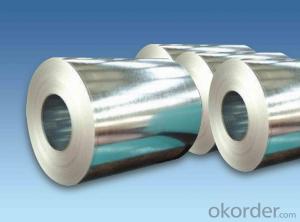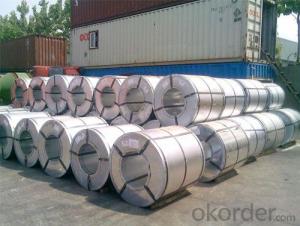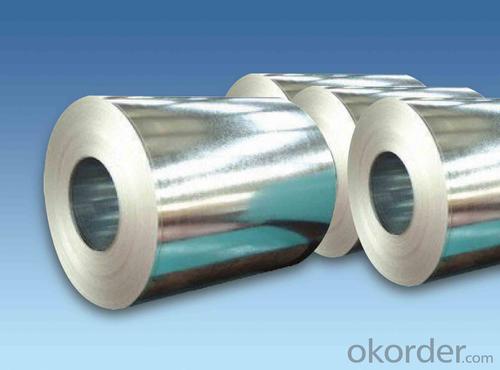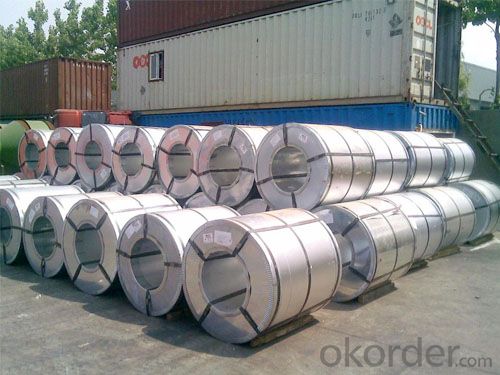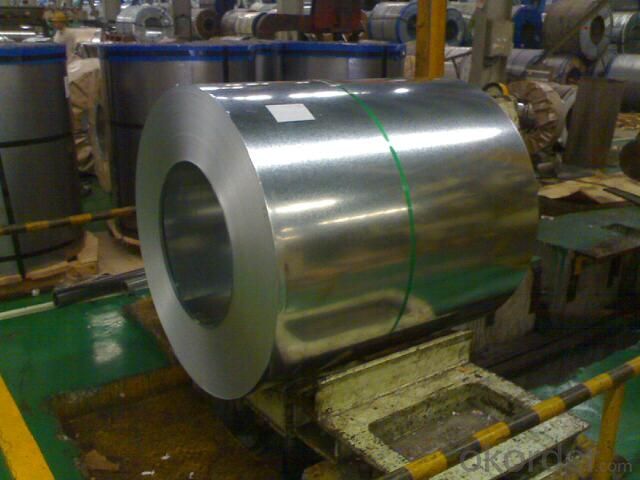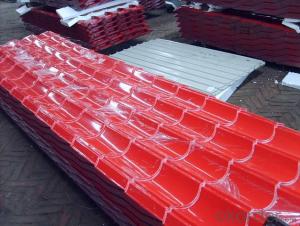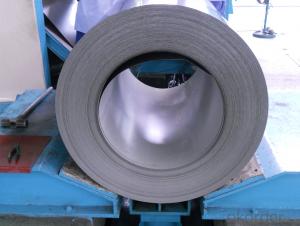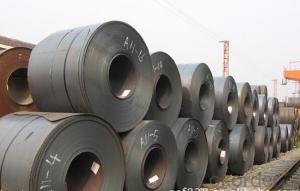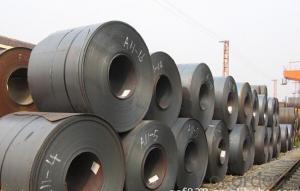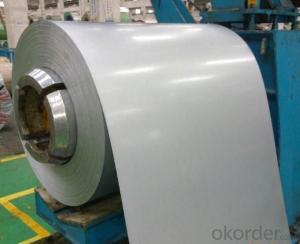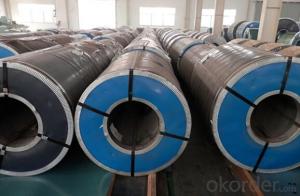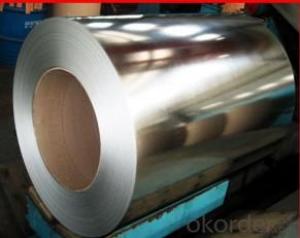Hot-Dip Galvanized Steel Coils -EN10327 DX51D+Z
- Loading Port:
- China main port
- Payment Terms:
- TT OR LC
- Min Order Qty:
- 50 m.t.
- Supply Capability:
- 10000 m.t./month
OKorder Service Pledge
OKorder Financial Service
You Might Also Like
Hot-Dip Galvanized Steel Coils -EN10327 DX51D+Z
1.Structure of Hot-Dip Galvanized Steel Sheet Description:
Hot-dip galvanized steel coils are available with a pure zinc coating through the hot-dip galvanizing process. It offers the economy, strength and formability of steel combined with the corrosion resistance of zinc. The hot-dip process is the process by which steel gets coated in layers of zinc to protect against rust. It is especially useful for countless outdoor and industrial applications. Production of cold formed corrugated sheets and profiles for roofing, cladding, decking, tiles, sandwich walls, rainwater protective systems, air conditioning duct as well as electrical appliances and engineering.
2.Main Features of the Hot-Dip Galvanized Steel Sheet:
• Smooth and flat surface
• Workability, durability
• Excellent anticorrosive property
• High strength
• Good visual effect
3.Hot-Dip Galvanized Steel Sheet Images
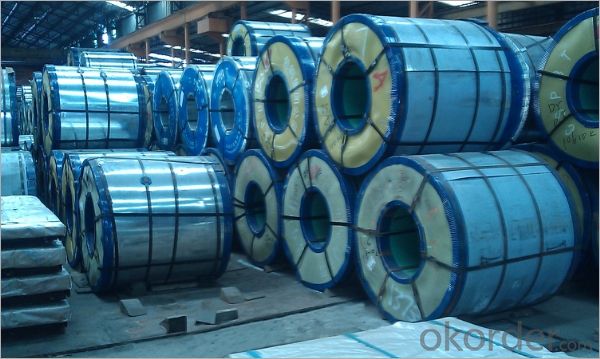
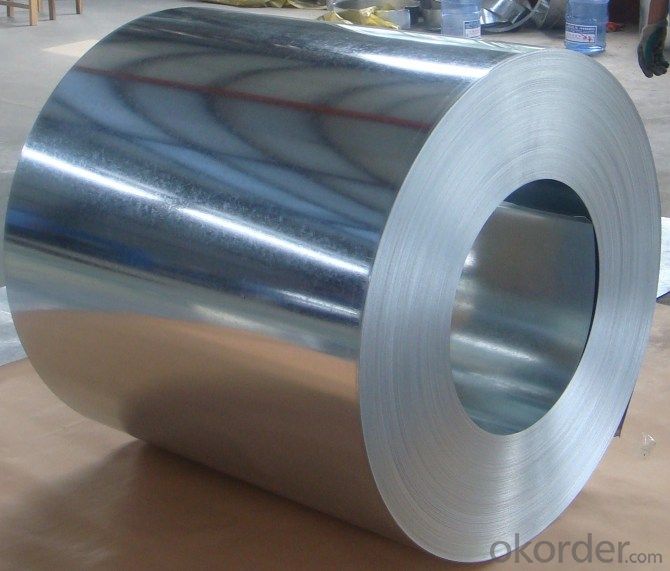
4.Hot-Dip Galvanized Steel Sheet Specification
Standard: ASTM, JIS,EN
Grade: CS, DX51D+Z,SGCC, SS 230~550,S220GD+Z~S550GD+Z, SGC340~SGC570
Thickness: 0.18mm~5mm
Width: max 2000mm
Coil weight:3-12 MT
Coil ID:508/610mm
Surface structure: zero spangle, regular spangle or minimum spangle
Surface treatment: Chromate treatment, Oiled/dry, skinpassed/non-skinpassed
Packing: Standard seaworthy export package
5.FAQ of Hot-Dip Galvanized Steel Sheet
1.How to guarantee the quality of the products?
We have established the international advanced quality management system,every link from raw material to final product we have strict quality test;We resolutely put an end to unqualified products flowing into the market. At the same time, we will provide necessary follow-up service assurance.
2. How long can we receive the product after purchase?
Usually within thirty working days after receiving buyer’s advance payment or LC. We will arrange the factory manufacturing as soon as possible. The cargo readiness usually takes 15-30 days, but the shipment will depend on the vessel situation.
- Q: I noticed a friend's appliances are not magnetic, and mine are. Both are stainless steel. Are there two types of stainless steel or something? Thanks
- Is Stainless Steel Magnetic
- Q: What are the different types of steel coil handling systems?
- There are several types of steel coil handling systems, including overhead crane systems, coil grab systems, coil transfer cars, and coil tilters. Each system is designed to efficiently and safely handle steel coils in different environments and applications.
- Q: How are steel coils used in the production of roofing systems?
- The production of roofing systems involves the utilization of steel coils in various ways. Initially, the steel coils undergo unrolling and are then fed into a machine, where they are cut to the desired length for the roofing panels. Typically, these coils are composed of galvanized steel, which is coated with a layer of zinc to protect against rust and corrosion. Once the coils have been cut, they are subsequently passed through a roll-forming machine. This machine is responsible for shaping the steel into the necessary profile for the roofing panels. The specific shape of the panels may differ depending on the design and functionality of the roofing system. Following the formation of the steel, it may undergo additional processes, such as embossing or stamping, to incorporate texture or patterns onto the panels. This aids in enhancing the visual appeal of the roofing system and providing it with a distinct appearance. After the steel panels have been formed and processed, they are coated with supplementary protective layers or finishes, such as paint or polymer coatings. These coatings further augment the durability of the roofing system and offer resistance against weather elements, UV rays, and corrosion. The final step in the production of roofing systems entails the installation of the steel panels on the roof. Typically, the panels are secured to the roof structure using screws or nails. The panels are designed to interlock, ensuring a secure and watertight installation that safeguards against leaks and moisture infiltration. In conclusion, steel coils play a vital role in the production of roofing systems, providing a durable and long-lasting material that can withstand harsh environmental conditions. The versatility of steel permits various design options and customization, making it a favored choice for roofing applications.
- Q: How are steel coils used in the manufacturing of automotive wheels?
- Steel coils are used in the manufacturing of automotive wheels as the primary raw material. These coils are first processed through a series of cutting, bending, and shaping processes to form the wheel rims. The steel's strength and durability make it an ideal material choice for withstanding the weight and stresses of a vehicle. Additionally, the coils undergo various heat treatment and finishing processes to enhance their resistance to corrosion and provide a smooth surface for painting or coating. Ultimately, steel coils play a crucial role in the production of automotive wheels, ensuring their structural integrity and performance on the road.
- Q: What is the average lifespan of a steel coil?
- Several factors can influence the average lifespan of a steel coil. These factors encompass the quality and type of steel utilized, the conditions in which the coil is stored or used, and the maintenance and care it receives. Typically, a steel coil that is well-maintained can endure for approximately 10 to 30 years. Nevertheless, this is merely an approximation, and the actual lifespan can be either shorter or longer depending on the aforementioned factors. For example, if the coil is exposed to severe environmental conditions, such as extreme temperatures or corrosive elements, its lifespan may be diminished. Regular upkeep and proper storage can significantly prolong the longevity of a steel coil. This entails ensuring that the coil is stored in a dry and safeguarded environment, frequently inspecting and addressing any indications of corrosion or damage, and conducting routine cleaning and lubrication as necessary. Ultimately, the average lifespan of a steel coil is contingent upon various factors, and it is advisable to consult the manufacturer or industry experts for a more precise estimation based on specific circumstances and conditions.
- Q: What are the different types of steel coil handling attachments?
- In industrial settings, various types of steel coil handling attachments are commonly utilized. These attachments are designed to handle steel coils of different sizes and weights in a safe and efficient manner. One commonly used attachment is the coil lifter. Made of durable steel, this attachment securely grips the steel coil. It is equipped with adjustable arms or hooks that can be positioned to fit the specific size and shape of the coil. To ensure safe transportation, coil lifters are often used in conjunction with cranes or other lifting equipment. Another frequently seen attachment is the coil grab. Similar to a coil lifter, it securely grips and lifts steel coils. However, coil grabs have a more compact design and are generally used in applications where space is limited. They can be operated manually or attached to a crane or forklift. Additionally, there are coil tongs specifically designed for handling smaller steel coils. These tongs are commonly used in manufacturing or processing facilities where coils need to be lifted and moved within confined spaces. With adjustable jaws, coil tongs provide a secure grip on the coil. In certain cases, magnetic attachments are employed for handling steel coils. These magnets attract and hold onto the steel, allowing for easy lifting and transportation. Magnetic attachments are particularly useful in environments with extreme temperatures or when the steel coils are coated. It is important to consider the size, weight, and specific requirements of the application when selecting a steel coil handling attachment. Industrial equipment suppliers can offer guidance in choosing the most suitable attachment for a particular situation.
- Q: What are the dimensions of steel coils used in the energy sector?
- The dimensions of steel coils used in the energy sector can vary depending on the specific application and requirements. However, commonly used dimensions for steel coils in the energy sector range from 0.5mm to 5.0mm in thickness, with widths typically ranging from 600mm to 2000mm. The diameter of the coil can vary as well, with commonly used sizes ranging from 1000mm to 2200mm. These dimensions are chosen to ensure the coils can be easily transported, processed, and utilized in various energy sector applications such as power plants, oil and gas pipelines, and renewable energy projects. It is important to note that these dimensions are not fixed and can be customized based on specific project requirements.
- Q: What is the accuracy of steel tape inspection?
- This is the smallest scale brothers precision measuring tools, minimum scale steel tape is mm, mm is estimated to read out the data, such as steel tape measure length is 12.5 mm, which is 12 in the steel tape on the scale with the number of 0.5.It was read out. So the accuracy is millimeters.
- Q: i bought an airsoft gun and it said steel recievers on it im not sure what that is
- It means that the receiver is steel or metal. The receiver is like the bottom and body part of your gun.
- Q: How are steel coils inspected for surface defects using non-destructive testing methods?
- Steel coils are inspected for surface defects using non-destructive testing (NDT) methods to ensure their quality and integrity. There are several common NDT methods employed in this process. One of the most widely used methods is visual inspection, where trained inspectors visually examine the surface of the steel coils for any visible defects such as scratches, cracks, pits, or corrosion. This method is relatively simple and cost-effective but is limited to detecting only surface-level defects. Another commonly used NDT method is magnetic particle testing (MT). This method utilizes the principles of magnetism to identify surface and near-surface defects in ferromagnetic materials like steel. A magnetic field is applied to the steel coil, and iron particles are applied to the surface. If there is a defect, such as a crack or discontinuity, the iron particles will concentrate around it, making the defect visible to the inspector. Liquid penetrant testing (PT) is another NDT method used to inspect steel coils for surface defects. In this method, a liquid penetrant is applied to the surface of the coil. The penetrant is drawn into any surface defects by capillary action. After a certain period, excess penetrant is removed, and a developer is applied. The developer draws out the penetrant from any defects, making them visible to the inspector. Ultrasonic testing (UT) is a widely used NDT method that can detect both surface and subsurface defects in steel coils. High-frequency sound waves are transmitted into the steel coil, and the reflected waves are analyzed to identify any abnormalities. This method can detect defects such as cracks, inclusions, and voids that may not be visible to the naked eye. Additionally, eddy current testing (ECT) is another NDT method used for inspecting steel coils. This method utilizes electromagnetic induction to detect surface and near-surface defects. A coil carrying an alternating current is placed near the surface of the coil being inspected. Any changes in the coil's electrical conductivity caused by surface defects are detected and analyzed, allowing the inspector to identify and evaluate the severity of the defects. In conclusion, steel coils are inspected for surface defects using various non-destructive testing methods such as visual inspection, magnetic particle testing, liquid penetrant testing, ultrasonic testing, and eddy current testing. These methods ensure the quality and integrity of the steel coils before they are used in various applications.
Send your message to us
Hot-Dip Galvanized Steel Coils -EN10327 DX51D+Z
- Loading Port:
- China main port
- Payment Terms:
- TT OR LC
- Min Order Qty:
- 50 m.t.
- Supply Capability:
- 10000 m.t./month
OKorder Service Pledge
OKorder Financial Service
Similar products
Hot products
Hot Searches
Related keywords
